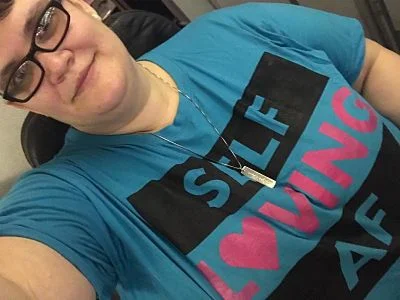I do not know if there is an in-patient eating disorder treatment center that currently exists that is safe for all people with non-dominant systemic identities at all levels of the organization. I do not know of an eating disorder treatment program for higher level of care where I as a fat, queer, non-binary person would feel safe to attend.
Read MoreI’m finalizing a presentation on the ways that sizeism and eating disorders, separately and together, intersect for trans and gender diverse folx. While researching scientific and community based articles, it really got me thinking about my experience as a kid (a lot research is focused on trans youth) coming of age while recognizing my sexuality was different than almost everyone I knew.
Read MoreI know you are working your hardest to provide the best care possible. I know you are working to improve people’s health, so that they can enjoy their lives longer. I know that you have to work within a rather broken system with short appointment times, insurance requirements, and have to work with the resources that you have available. I know that not every clinic, agency, hospital, or practice has the same resources as others.
Read MoreWhile there is research to support that weight stigma is a risk factor for binge eating disorder, it doesn’t appear that medical professionals or administrators are taking action to reduce weight stigma. There continues to be a high rate of implicit bias within medical professionals. A recent study focused on the weight bias within eating disorder treatment professionals which shows that they are not immune from a high rate of implicit bias like other medical professionals.
Read MoreLast night the seat next to mine on my flight was empty. This morning it isn’t. I’m not rolling in the dough enough to purchase a second seat ahead of time and wait to get reimbursed. So, I am going to have to see if someone will be willing to switch seats with me at the last minute where there is an empty middle. You know how willing people are to give that up. [insert eye roll] This puts me at risk of getting kicked off the flight.
Read MoreLet’s talk about Intuitive Eating. How do you navigate honoring your hunger or respecting your fullness, when you can’t afford to buy enough food? How do you enjoy the pleasure of eating, when you can’t buy food that sounds good to you? How do you enjoy the pleasure of eating, when you are worried about if you will be evicted from your home?
Read MoreOur relationship with the people that raised us often forms how we relate to food and body as we grow and become adults. I’ve heard that the way we are spoken to as children is what becomes our inner voice/inner critic as we become more independent from our caregivers. I don’t know if this is exactly true. What I do know is that my parents had a major influence on my relationship with food and body. Do I think they caused my eating disorder? Nope. They were doing the best they knew how with the resources they had. Plus genetics, culture, finances, and all that. There are lots of factors.
Read MoreIn my graduate school classes, sizeism is mentioned once in the entire five years I’m a graduate student. Every single class is required to talk about marginalized identities and how whatever topic the class is focused on impacts those who are more marginalized or oppressed. Fat people are never mentioned except in the one class one time. I know from my lived experience that fat people are oppressed and I began studying feminism and learning about the history of size oppression in college. Eating disorders are covered one day in my “abnormal psychology” class and never mentioned again. Even in my “psychology of women” class eating disorders were never mentioned and diet culture wasn’t talked about.
Read MoreIt was easy to know in high school when I was starving myself, using laxatives not as prescribed, and making myself throw up that I most likely had an eating disorder. This was the way I saw them represented in after school specials, and documentaries in health class. Though when I started seeing a therapist at 16, I was never told I had an eating disorder. I was never offered eating disorder treatment.
Read MoreI really did think that each time would be different. I really thought that I would fall into the 5% of people that would be able to maintain significant weight loss long term. I wanted to be anyway. I did NOT want to accept that I was just your average person who couldn’t maintain weight loss over time.
Read MoreGreat question! It’s really interesting to experience people’s reactions when they hear my business name. Some stare blankly at me. Some seem to look confused. Once while giving my elevator speech in a room full of networking professionals, a man couldn’t contain his laughter. I don’t know if it was out of awkwardness or actually thinking it was laughable. Someone once asked me why I used the word “fat” in my business name. And then. . .there those who get it. They really get it. And I am met with a huge, knowing smile and/or some version of “what a great name!”
Eating disorders are not addictions. While this statement is supported by many in the eating disorder (ED) community, it seems like a fairly fringe idea to assert for those outside the ED community. In this essay, I will provide a critique of research commonly used to equate eating disorders with addictions, particularly food and/or sugar addiction. What many people who research food addiction and those who support the food addiction model actually are referring to is the effect of semi-starvation and starvation on the body, not food addiction.
Read More












